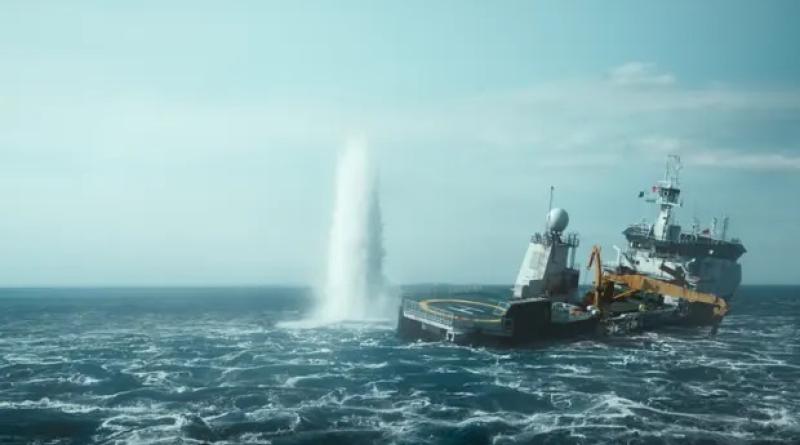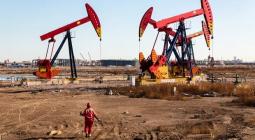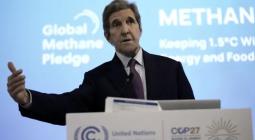Climate crisis fuels new wave of TV ‘eco thrillers’

A sudden outbreak of online searches for terms like “deadly fungus invasion”, “poisonous fog spores”, “toxic seafood” and “killer ice worms” might be worrying. It would, though, only be a reaction to the grim natural threats in the latest spate of hit television thrillers. Despite all the real-life horror in evidence across the planet, appetites for revelling in the fictional biological destruction of civilisation appear to be growing.
In the wake of The Last of Us, the acclaimed American drama series currently chronicling a lethal fungus attack, and following the malign fog enveloping Martin Compston in the Scottish sci-fi thriller The Rig, next comes The Swarm, a show with an equally terrifying premise from Game of Thrones’ producer Frank Doelger.
When the series premieres next Sunday in Germany, prior to being shown across Europe and Britain this spring, it will plunge audiences into a near future in which the sea takes its revenge on humanity. Soon the race is on for the world’s scientists to unravel the nature of the chain reaction that is wreaking havoc. The Swarm is based on an internationally bestselling book of the same name by Frank Schätzing, and its screening at the opening of a major entertainment showcase in Berlin will mark a new high-water mark in a rising tide of expensive fictional TV dramas based on emerging environmental science.
“In The Swarm, species start changing their behaviour and the scientists have to put the clues together,” said Jon Copley, professor of ocean exploration at the University of Southampton and an adviser on the big-budget series. Copley is also a marine biologist working in the deep sea, like one of the show’s multinational key characters, a scientist based in Bergen, Norway. “It becomes clear it’s happening in response to the things we’ve done to the deep sea. There is a strong element of sci-fi, but it’s important that it comes out of real science. And there’s more of this kind of thing out there now. I noticed The Rig had some similar themes.”
Several of the new “eco-apocalyptic” dramas seem to function as a form of self-punishment. Audiences are invited to sit down and face the imagined consequences of mankind’s wide-scale exploitation of earth’s natural resources. The Swarm has even been billed by Doelger as “a monster movie in which we discover that the monster is us”, while The Last of Us, which was based on a popular video game, definitely highlights some of the worst sides of human behaviour, with only occasional cameo appearances from our nicer traits, such as shared affection and resilience. Both dramas are a re-invention of the “eco thrillers” broadcast in the early days of environmental activism in the 1970s and 80s.
“There was a lot of this stuff around then too, when we were just working it all out,” said Copley. “BBC serials like Doomwatch and The Edge of Darkness were great and I am an avid follower of the new ones.”
Copley suspects viewers today demand a higher level of scientific accuracy in the background of these stories. “I hope there’s not more scientific information than you might need in The Swarm, but I have worked on this programme for more than two years and I must have written about 80,000 words in answer to the writers’ questions about what would be realistic,” he said. “They wanted to know things like exactly how whales sleep.”
While it is chiefly entertainment, there is some hope, Copley believes, that such shows can educate the public about the importance of scientific collaboration and the possible impact of human actions: “The biggest effect on sea species is climate change. It is already affecting even the deep ocean. It makes the sea less alkaline and so it is harder for oxygen to get through. It is important people realise how things connect.”
In switching from the epic fantasy of Game of Thrones to a real-world scenario in The Swarm, Doelger has spoken of the prescience of the original German novel in 2004: “It’s astonishing how many things it sees coming – it also speaks to its time and needed to be brought forward into our own.”
Copley, who also worked on the BBC’s Blue Planet II, said advances in understanding have been written into the drama, but that his own “golden rule” is that “the science content should be like an iceberg, in that it’s all been worked out, but only little bits of it emerge, as needed, in the story”.
… as 2023 gathers pace, and you’re joining us from Greece, we have a small favour to ask. A new year means new opportunities, and we're hoping this year gives rise to some much-needed stability and progress. Whatever happens, the Guardian will be there, providing clarity and fearless, independent reporting from around the world, 24/7.
Times are tough, and we know not everyone is in a position to pay for news. But as we’re reader-funded, we rely on the ongoing generosity of those who can afford it. This vital support means millions can continue to read reliable reporting on the events shaping our world. Will you invest in the Guardian this year?
Unlike many others, we have no billionaire owner, meaning we can fearlessly chase the truth and report it with integrity. 2023 will be no different; we will work with trademark determination and passion to bring you journalism that’s always free from commercial or political interference. No one edits our editor or diverts our attention from what’s most important.
With your support, we’ll continue to keep Guardian journalism open and free for everyone to read. When access to information is made equal, greater numbers of people can understand global events and their impact on people and communities. Together, we can demand better from the powerful and fight for democracy.
Whether you give a little or a lot, your funding is vital in powering our reporting for years to come. If you can, please support us on a monthly basis from just €2. It takes less than a minute to set up, and you can rest assured that you’re making a big impact every single month in support of open, independent journalism. Thank you
cover photo: In the new series The Swarm, a mysterious force of the deep declares war on humanity after years of relentless climate change. Photograph: ©Schwarm TV Production GmbH & Co. KG/Fabio Lovino




